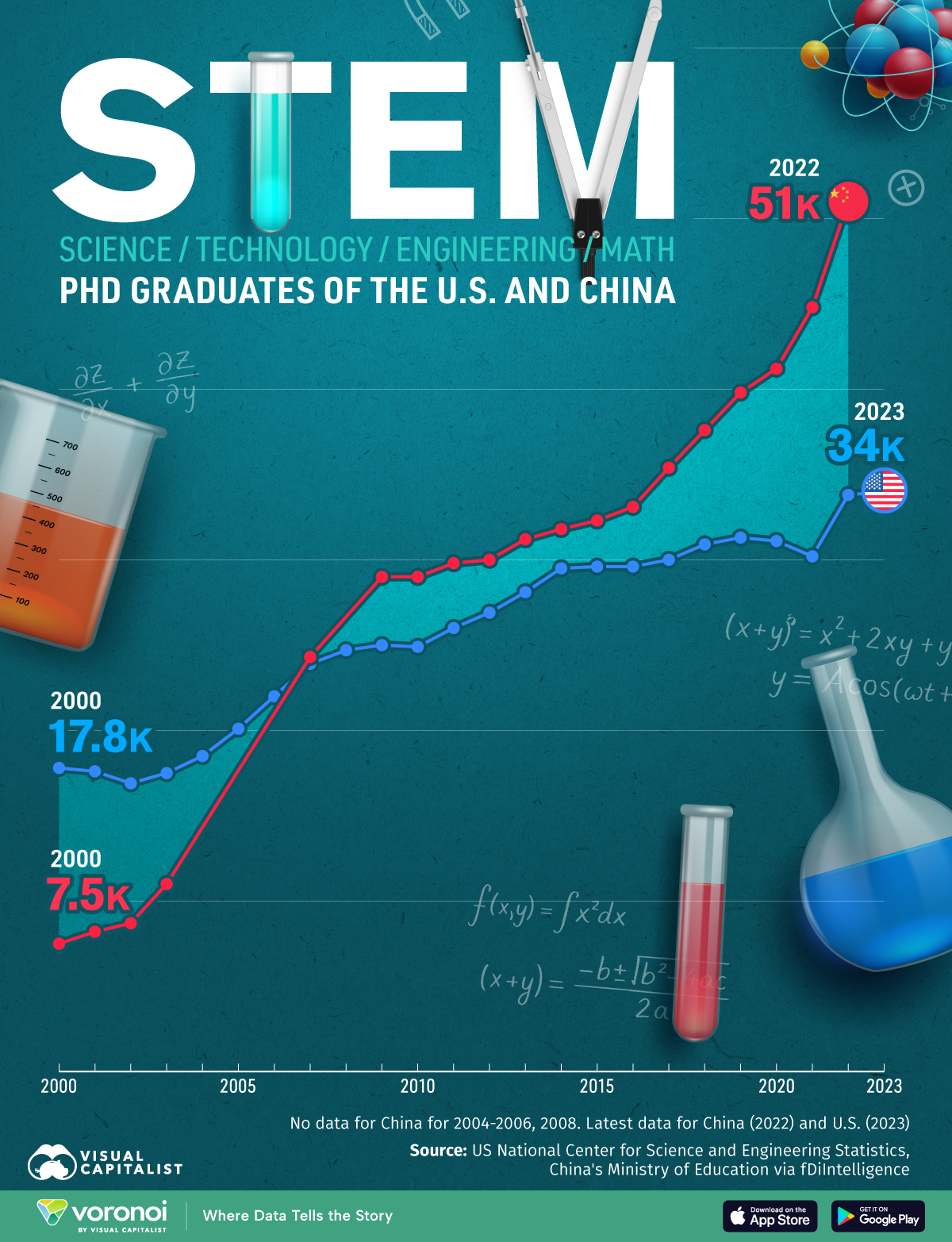![]()
See this visualization first on the Voronoi app.

Use This Visualization
Chinese vs. America STEM PhD Graduates
This was originally posted on our Voronoi app. Download the app for free on iOS or Android and discover incredible data-driven charts from a variety of trusted sources.
STEM (science, technology, engineering, and math) PhD graduates are essential to scientific and technological progress, and recent trends show China outpacing the U.S. in producing them.
This graphic visualizes the number of STEM PhD graduates from Chinese universities versus U.S. universities, from 2000 to 2022 for China and up until 2023 for the United States.
Data comes from the U.S. National Center for Science and Engineering Statistics and China’s Ministry of Education via fDI Intelligence.
China’s STEM PhD Grads Surpass the U.S.
Below, we show the number of PhD degrees awarded in Chinese and U.S. universities in thousands by year.
| Year | Chinese STEM PhD grads (thousands) | U.S. STEM PhD grads (thousands) | Difference (thousands) |
|---|---|---|---|
| 2000 | 7.5 | 17.8 | -10.3 |
| 2001 | 8.2 | 17.6 | -9.4 |
| 2002 | 8.7 | 16.9 | -8.2 |
| 2003 | 11.0 | 17.5 | -6.5 |
| 2004 | 18.5 | ||
| 2005 | 20.1 | ||
| 2006 | 22.0 | ||
| 2007 | 24.4 | 23.9 | 0.5 |
| 2008 | 24.7 | ||
| 2009 | 29.0 | 25.0 | 3.9 |
| 2010 | 29.0 | 24.9 | 4.2 |
| 2011 | 29.8 | 26.0 | 3.9 |
| 2012 | 30.0 | 26.9 | 3.1 |
| 2013 | 31.2 | 28.1 | 3.0 |
| 2014 | 31.8 | 29.5 | 2.4 |
| 2015 | 32.3 | 29.6 | 2.7 |
| 2016 | 33.1 | 29.6 | 3.5 |
| 2017 | 35.4 | 30.0 | 5.3 |
| 2018 | 37.6 | 30.9 | 6.7 |
| 2019 | 39.8 | 31.3 | 8.5 |
| 2020 | 41.2 | 31.1 | 10.2 |
| 2021 | 44.8 | 30.2 | 14.6 |
| 2022 | 51.0 | 33.8 | 17.2 |
| 2023 | 34.0 |
China is rapidly outpacing the U.S. in producing PhD graduates in science, technology, engineering, and math (STEM), awarding over 50,000 STEM doctorates in 2022, more than double its 2007 total—when it first overtook the United States.
While China has steadily expanded public investment in universities and research, the U.S. has seen slower growth, with STEM PhD output rising just 41% over the same period and recent freezes in federal funding for leading institutions, including world-renowned schools like Harvard.
According to the Center for Security and Emerging Technology, China is projected to award double the number of PhD degrees in STEM compared to the U.S. in 2025.
This growing gap signals a shift in global competitiveness, with major implications for future innovation in fields like AI, semiconductors, and clean tech.
China is already closing the gap with the U.S. in key technological metrics like AI model performance.
Learn More on the Voronoi App ![]()
To learn more about the numbers behind the post-secondary industry, check out this graphic that visualizes the largest American university endowments.